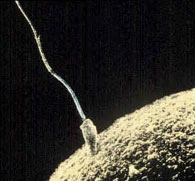Lesbian couples may be able to have a baby that shares both their genes in the very near future.

The technique was first developed to enable men with no sperm, such as those suffering from cancer, for example, to father children.
Using similar techniques, doctors would take cells from one woman that would be turned into artificial sperm and fertilise the egg in another woman.
The scientists who are already testing the technique expect to have it available to lesbian couples within two years.
Some scientists, however believe the technique, dubbed haploidisation - the artificial splitting of two chromosomes, one inherited from each parent - is dangerous and can lead to birth defects that cannot be detected until well after the baby is born.
"This technology has a high risk of creating damaged people and therefore I don't think it should be allowed to go ahead," Professor Bill Ledger, of Sheffield University, told the paper.
Experts have pointed out that although there is a lucrative market for fertility treatments and the US gives a huge incentive to develop such techniques, little follow-up work has been done on the long-term consequences.
